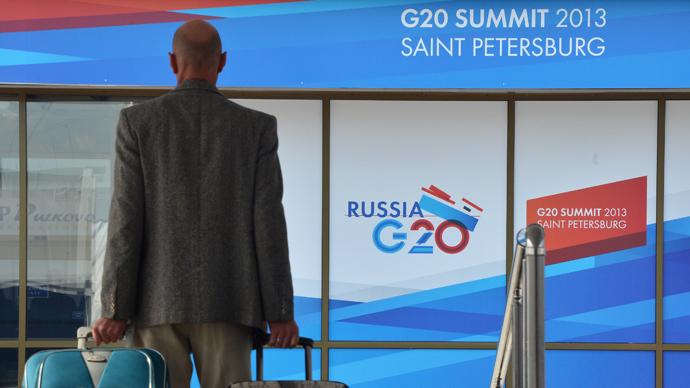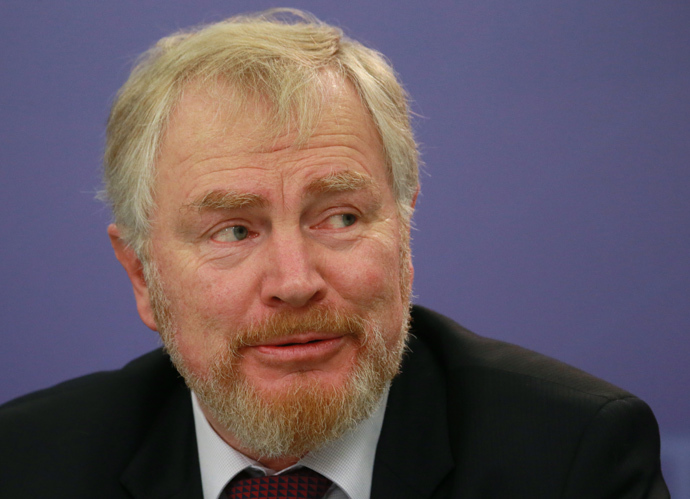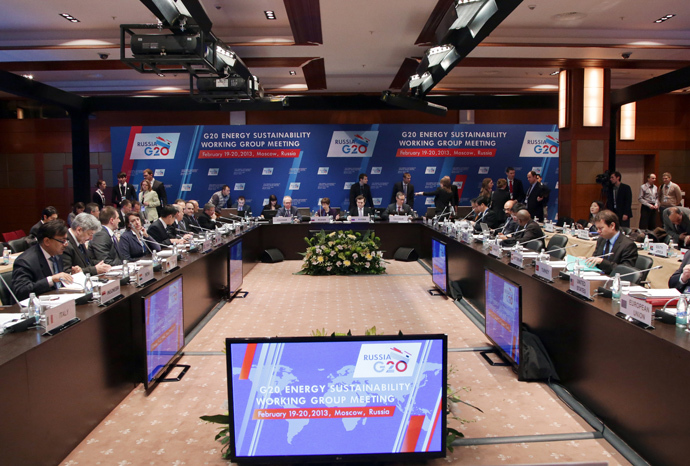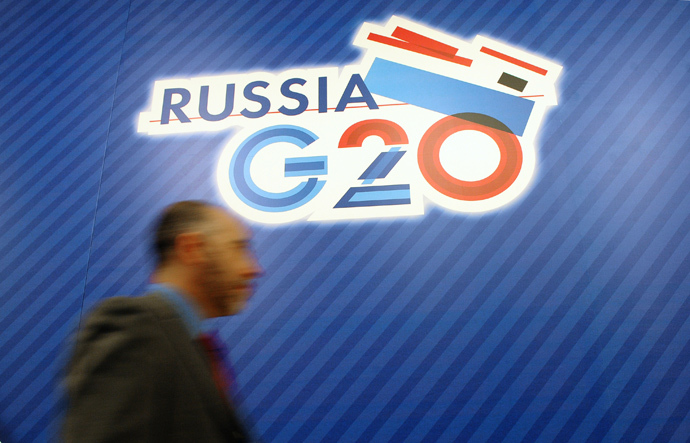Russia treats G20 as process, not single event

With the world economic crisis getting past its peak, unemployment and tax evasion are expected to the hot topics at the upcoming G20 summit in Saint Petersburg, Russia’s deputy finance minister, Sergey Storchak, told RT.
Russia, which chairs the group of the world’s major economies in 2013, will host the meeting of the G20 head of governments on September 5-6.
Storchak believes that Russia’s partners are satisfied with the
job the country has done since the start of the year and that the
summit will continue this trend.
RT:How significant was it for Russia to be the G20
chair? And what are expectations of the upcoming summit?
Sergey Storchak: The country gets a chance to be the chair
of this forum one in 20 years – that, in itself, determines the
huge emphasis we place on this. It’s not only about the
leadership of the country – the President, the Prime Minister –
this value, this work is kindly lead by the whole team. We
proceed from the fact that the chair has the opportunity to
consolidate the countries with different interests to solve the
most difficult task of modern times – the problem of
unemployment.
On the other hand, as we interact with our partners we receive an
important intellectual product, attributed to their experience in
tackling the same problem of unemployment. Especially, the
structural unemployment caused by the misbalance between demand
on the labor market and supply of staff, which are required in
agriculture, production sector and other branches of economy.
Both internal and external political aspects have the same
meaning for the chair country. We proceeded from that and, I
think, we’ve built up an agenda accordingly. As of now, I’m sure
that our G20 colleagues are satisfied with the work process
during our chairmanship and with the overall results we’ll
achieve during the meeting of leaders in Saint Petersburg.

RT:How important is it for Russia to demonstrate its a
friendly environment to do business with less corruption, less
red tape? Is that how you see the G20 meeting?
SS: We have a leaders meeting, not a business summit. G20 is
nearby, but it’s going to be different. As far as leaders and
ministers are concerned, we’re trying to be very pragmatic. It
doesn’t mean that we’re not going to be friendly. But ‘friendly’
is the second, ‘pragmatic’ is the first. We appreciate the time
the leaders and ministers are going to devote to the meeting to
deliver their ideas and their knowledge to the success of the G20
process. So, for us this is very important. We don’t treat G20 as
an event, for us it’s a process, which started on December 1 and
is still continuing and it will go on after the summit in
Saint-Petersburg. This is the approach we’re using in working on
the issue.
RT:Tax evasion has been a huge topic at the G8 meeting
in Northern Ireland. What processes are going to be made next
week to really move on with that issue?
SS: You know, last month here in Moscow G20 ministers
endorsed the plan on BEPS (base erosion and profit shifting) and
the exchange of tax information. But the tax issues are so
delicate, they touch all people. So, the issue needs to have a
political impulse, political support. And political support means
the leaders’ involvement in the process. That’s why the tax
issues will be partied to other discussions on finance in Saint
Petersburg and it’ll mean that the plan on BEPS will be endorsed
by leaders as well. At the end it would mean that they’ll issue
internal instructions to ministers, to the tax authorities to
work on the plans. I’m not sure that without direct leaders’
involvement the successful implementation of the plan will be a
true process.
We need the leaders’ support because in any case, even in my
country, the tax authorities are independent. While we work
together with them, I mean the ministry of finance and tax
authorities – we’re almost one team. But still it’s not one team.
We have different responsibilities. I know in many other G20
members, tax authorities need to have a strong political impulse
to go on with the taxation. Especially, having in mind, that
afterwards – after governments make decisions, they need to be
agreed on by the parliaments in forms of laws. Here, without the
political support we’ll have big differences.

RT:Do you think the tax evasion issue is a harder challenge for Russia than for other G20 states?
SS: You mean in terms of internal work? I don’t think so.
You see, even before we started discussion of this item within
the G20, the government and the President were quite active in
discussing the idea of “de-offshore-isation” of Russian economy.
So, it means that we, for ourselves, decided long ago
international cooperation in the field of tax-base erosion need
to be tackled and need to be dealt with together by many-many
nation involved in international investment and international
trade.
RT:Greece has asked for a third bailout this week,
with the EU still being in a lot of trouble. Is that going to be
a topic at the G20 summit?
SS: I’m not familiar with all the details. There’s
different information, which came to my office. Some said that
it’s going to be another bail-in process, but as far as I know
the minister of finance of the Republic of Greece said that he
would mean something different – not bail-in, but to use other
instruments to decrease the financial burden on the Greek
economy. We’ll see. We need details, but Greece’s problem isn’t
on the agenda of the G20. I don’t think we’re ready, I mean, the
club is ready to discuss the issue in detail.

RT:How confident are you that the emerging markets, BRIC economies can get their growth back in the near term as it was before the crisis?
SS: It happened so that for many emerging markets the source of growth was exports. Now the situation is changing. Global economy is changing and internal political climate is changing. So, I’m personally very glad to hear that more and more often the leaders of the emerginig markets are talking about the need to rely on the internal demand. And internal demand is really increasing. There are facts that due to internal demand, the salaries are increasing and the cost of labor increases as well in emerging markets. So, it means that stimulus for export will decrease and stimulus for internal consumption will increase. So, I think the gap the quality of life between developed and emerging markets is still very huge. And this gap is the source for growth the emerging market economies for near future. And near future means 20 or 30 years, something like that.
RT:Do you agree with Russian president, Vladimir
Putin, who said that the worst of the crisis is over?
SS: I agree with this conclusion. The biggest problem of
the crisis in 2008-2009 was that the people who were in charge of
the decision making didn’t understand what they were supposed to
do; in what sphere they needed to put all the necessary forces to
stop the depression in the economy, the decrease in growth. So,
after some research, they’ve found the necessary answers to this.
The financial regulation reform is the most obvious one – too big
to fail issue is the most obvious one. And during the last five
years, the G20 succeeded quite a lot in financial regulation
reform. And there are other fields, which can be treated as well
balanced approached. For example, this balance between fiscal
consolidation and fiscal stimulus, after big discussions we
managed to find the right approach on case by case
basis.
RT:How concerned you are when or if the US Federal Reserve tapers its stimulus do you think it’ll have a catastrophic effect on the growth or do you think that it’s a good idea?
SS: I hope that the ministers will discuss the issue. I’d
never refer to this thing as a catastrophe because the ministers
started those discussions on the so-called exit strategies in
2008. I can’t say the discussions weren’t tough because of
obvious reasons still in the process of re-balancing. After these
years, the ministers accumulated huge information and huge
knowledge on how the problems can be dealt with plus during the
last four years we’re witnessing the quick development of
the local currency bond markets. They’re becoming quite an
important source in financing investments for local companies. It
means that nowadays the ministers and bank authorities have
knowledge of how to deal with the unpredictable changes on the
currency markets. So, maybe it’s the most important thing. Plus
we still have time to discuss with the US authorities on their
approach to further reliance on quantitative easing policies.
We’ll see their actions. Normally, they explain their position
very well.
The statements, views and opinions expressed in this column are solely those of the author and do not necessarily represent those of RT.












